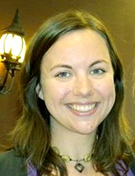Christine Mair, University of Maryland Baltimore County
| When |
Sep 10, 2018
from 12:00 PM to 01:00 PM |
|---|---|
| Where | 1101 Morrill Hall |
| Contact Name | Jennifer Doiron |
| Contact Phone | 301-405-6403 |
| Add event to calendar |
|
About the Presentation
Dr. Mair will present a study examining cross-national patterns in older adults’ social networks with an emphasis on the cultural role of friends and family in the lives of older adults who lack children and/or partners. Increasing numbers of older adults in the US and cross-nationally are without children or partners in later life and have therefore been classified as at-risk for “aging alone.” The study challenges dominating assumptions about “aging alone” and hypothesizes that those without children and/or partners have more friends in their networks, who may be a key source of support in later life. While this hypothesis is consistent with previous literature, it has yet to be documented empirically and is thus overlooked in current narratives about “aging alone.” The presentation draws on individual-level data from the Survey of Health, Ageing, and Retirement in Europe (SHARE, Wave 6) and nation-level data from the European Values Survey (EVS) to estimate cross-sectional, multilevel models exploring the social network composition older adults. Results partially support the hypothesis that childless and unpartnered older adults have more friends in their networks, particularly in nations that place a stronger emphasis on friends. Future studies of “kinlessness” should consider structural and cultural patterns of friendship. Previous research on “aging alone” may have overestimated risk in friend-centered cultures, but underestimated risk in family-centered cultures.
About the Speaker

Christine A. Mair is an Associate Professor of Sociology in the interdisciplinary Department of Sociology, Anthropology, and Health Administration & Policy at the University of Maryland, Baltimore County (UMBC) and holds a secondary appointment in the Department of Epidemiology and Public Health in the School of Medicine at the University of Maryland, Baltimore (UMB). As a sociologist and social gerontologist, her work seeks to document cultural variation in the relationship between social environments and health, with particular emphasis on risk and resilience in disadvantaged contexts in the US and cross-nationally. Her collaborators include scholars from psychology, social work, criminology, economics, epidemiology, and occupational health sciences and her work appears in various outlets including Social Forces, Social Science & Medicine, Journal of Gerontology: Social Sciences, The Gerontologist, Health & Place, Cancer, and Journal of Palliative Medicine.
